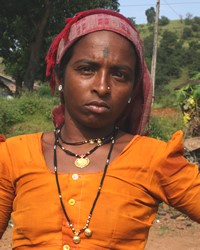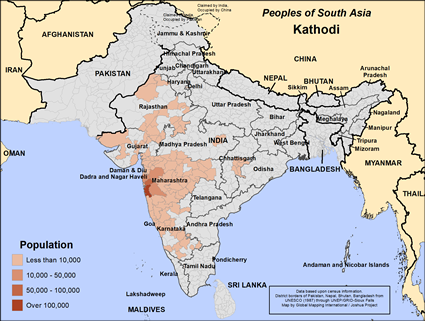Kathodi in India

Photo Source:
Copyrighted © 2026
Santosh Nimbalkar - Shutterstock All rights reserved. Used with permission |

Map Source:
People Group data: Omid. Map geography: UNESCO / GMI. Map Design: Joshua Project.
|
| People Name: | Kathodi |
| Country: | India |
| 10/40 Window: | Yes |
| Population: | 317,000 |
| World Population: | 317,000 |
| Primary Language: | Marathi |
| Primary Religion: | Hinduism |
| Christian Adherents: | 0.31 % |
| Evangelicals: | 0.00 % |
| Scripture: | Complete Bible |
| Ministry Resources: | Yes |
| Jesus Film: | Yes |
| Audio Recordings: | Yes |
| People Cluster: | South Asia Tribal - other |
| Affinity Bloc: | South Asian Peoples |
| Progress Level: |
|
Introduction / History
The Kathodi are an indigenous people who live in west India, mostly the Indian state of Maharashtra. The name Kathodi relates to the juice of the acacia catechu tree. During colonial days, the British rulers considered them to be an undesirable class of criminals. At that time the Kathodi lived in the forests and moved about in the pattern of nomads, fishing and hunting for their food. Today most Kathodi reside on in rural villages and work in agriculture. The Kathodi are a Scheduled Tribe which means they are eligible for public jobs and spots in Indian universities. Their primary language is Marathi. Illiteracy is a major issue for the Kathodi. The gospel will need to be given to them in oral and visual forms. A small fraction of the Kathodi claim to be believers in Jesus Christ.
What Are Their Lives Like?
Some Kathodi live near the forests and hills where they hunt wildlife and gather products of the that they can sell such as honey, firewood and charcoal. Others work are farm laborers on land owned by others. They are often poor, bonded laborers in Greater Mumbai area on tea, coffee, palm, banana and coconut plantations. Some Kathodi have moved to cities hoping for a better life. With few resources and job skills, they live in urban slums. They are noted for eating rodents which almost all Indians find abhorrent. They have monogamous marriages, meaning marriage is between one man and one woman. They have community councils to settle disputes and promote their interests.
What Are Their Beliefs?
The Kathodi practice Hinduism, the ancient religion of India. They worship and serve the gods of the Hindu pantheon. Their brand of Hinduism is strongly influenced by folk religion. Hindus believe that by performing rituals and good works that they will attain moksha or freedom from the endless cycle of birth, death and rebirth. The Kathodi visit Hindu shrines and offer prayers, food, flowers, and incense to their gods in hopes of gaining protection and benefits. They do not have a personal or familial relationship with their gods as Christians do. There are many forms of Hinduism, each with its own deities and beliefs. The main yearly holidays of the Kathodi people are Holi, the festival of colors and the start of spring, Diwali, the festival of lights, Navratri, the celebration of autumn and Rama Navami, Rama's birthday. The caste system divides Hindus into four main categories. The lowest communities are outside of the caste system. The Kathodi face discrimination in many forms. Some believe that the Kathodi people are involved with sorcery and black magic.
What Are Their Needs?
The Kathodi people need to find ways to earn a decent living. They need political power to protect themselves. They need to learn new job skills and a basic level of literacy. Most of all the Kathodi must hear and understand the good news about Jesus Christ. He alone can forgive their sins and give them a sure hope for the future.
Prayer Points
Pray that the community council and village leaders will come to Jesus Christ and lead others into a Disciple Making Movement. Pray that gospel recordings will bring them to salvation. Pray for spiritual openness to the things of Christ and a hunger for the truth of the word of God. Pray the Lord sends Indian workers to help meet the spiritual and physical needs of the Kathodi.